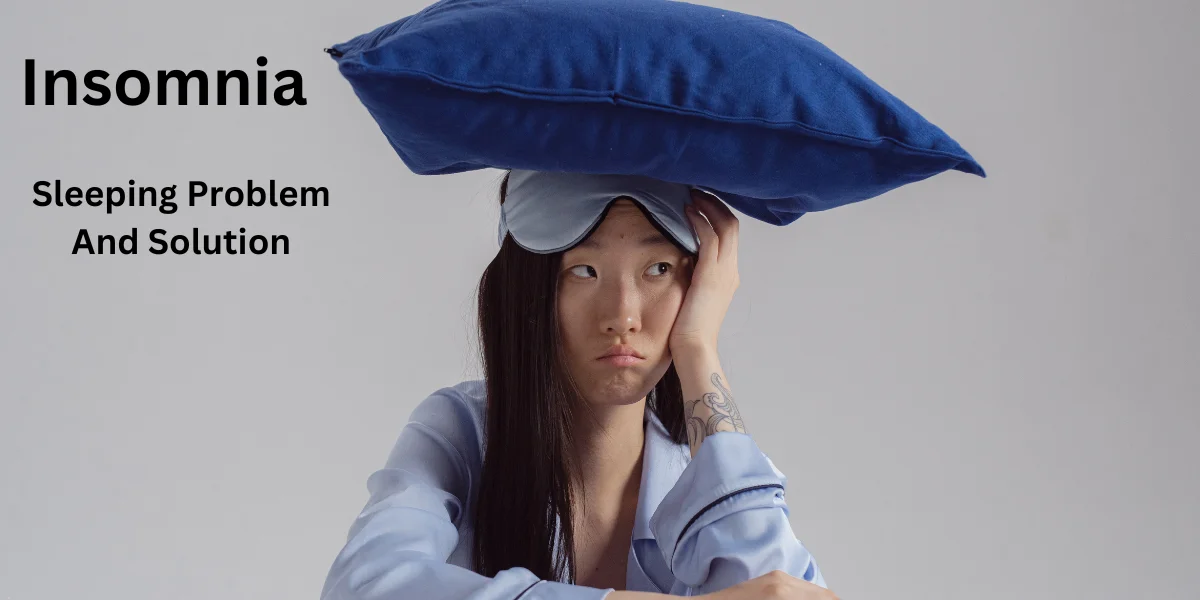In this modern world sleeping problem and solution of it is essential for healthy leaving .sleeping problem also known as Insomnia.Insomnia is a sleep disorder characterized by difficulty falling asleep, staying asleep, or both. Sleep insomnia refers specifically to difficulty falling asleep at night. People with insomnia may have trouble falling asleep even when they feel tired, and may lie in bed for hours without being able to drift off. This can cause significant distress, as well as daytime sleepiness and impaired performance or function.
Insomnia can be caused by a variety of factors, including stress, anxiety, depression, medication side effects, medical conditions, or lifestyle factors such as caffeine or alcohol consumption, lack of exercise, or irregular sleep patterns. Treatment for insomnia may include lifestyle changes such as reducing caffeine or alcohol intake, establishing a regular sleep schedule, and practicing relaxation techniques before bed. In some cases, medication or cognitive-behavioral therapy may also be recommended to help improve sleep.

What happens if you have insomnia ?
Insomnia is a sleep disorder characterized by difficulty falling asleep, staying asleep, or both. If you have insomnia, you may experience:
• Difficulty falling asleep at night
• Waking up during the night and having trouble getting back to sleep
• Waking up too early in the morning
• Feeling tired upon waking up
• Daytime sleepiness
• Difficulty concentrating or remembering things
• Mood disturbances, such as irritability or depression
• Increased errors or accidents due to fatigue.
Read more.insomnia
What causes sleep insomnia ? Or Why am I having trouble sleeping ?Why I am struggling to sleep at night?
Insomnia and trouble sleeping can be caused by a variety of factors, including:
1.Stress and anxiety: Psychological factors such as stress, worry, and anxiety can interfere with your ability to fall asleep.
2.Medical conditions: Insomnia can be a symptom of medical conditions such as chronic pain, respiratory problems, and gastrointestinal issues.
3.Medications: Certain medications such as antidepressants, corticosteroids, and beta-blockers can disrupt sleep.
4.Environmental factors: Noise, light, and temperature can affect your ability to sleep.
5.Sleep disorders: Conditions such as sleep apnea, restless leg syndrome, and narcolepsy can cause insomnia.
6.Lifestyle factors: Poor sleep hygiene habits, such as irregular sleep patterns, caffeine or alcohol consumption, lack of exercise, and eating too close to bedtime can interfere with sleep.
How can I reduce sleep insomnia ?
How can I solve my sleeping problem? what are sleeping problem and solution ?
There are several things you can do to reduce sleep insomnia:
1.Establish a regular sleep schedule: Go to bed and wake up at the same time every day, even on weekends.
2.Create a relaxing bedtime routine: Practice relaxation techniques such as deep breathing, meditation, or gentle stretching before bed to calm your mind and body.
3.Create a comfortable sleep environment: Make sure your bedroom is dark, quiet, and cool, and invest in a comfortable mattress and pillows.
4.Limit caffeine and alcohol intake: Avoid caffeine and alcohol in the hours leading up to bedtime.
5.Avoid stimulating activities before bed: Avoid activities that can be stimulating, such as working, exercising, or using electronic devices, for at least an hour before bedtime.
6.Get regular exercise: Regular physical activity can help improve sleep quality and reduce insomnia.
7.Seek treatment for underlying medical or mental health conditions: If you suspect that an underlying medical or mental health condition is causing your insomnia, seek treatment from a healthcare professional.
8.Consider cognitive-behavioral therapy (CBT): CBT is a type of talk therapy that can help you identify and change negative thought patterns and behaviors that contribute to insomnia.
9.Avoid daytime napping: Daytime napping can interfere with your ability to fall asleep at night.
How can I fix my trouble sleeping?
Fixing trouble sleeping requires a comprehensive approach that takes into account the various factors that may be contributing to your difficulties. Here are some steps you can take to improve your sleep:
• Establish a consistent sleep schedule
• Create a relaxing sleep environment
• Practice relaxation techniques
• Limit caffeine and alcohol intake
• Avoid stimulating activities before bed
• Get regular exercise
• Seek treatment for underlying medical or mental health conditions:
• Consider cognitive-behavioral therapy (CBT)
What causes sleep disturbances ?What causes inability to sleep ?
Sleep disturbances and inability to sleep can be caused by a variety of factors, including:
1.Stress and anxiety: Psychological factors such as stress, worry, and anxiety can interfere with your ability to fall asleep and stay asleep.
2.Medical conditions: Sleep disturbances can be a symptom of medical conditions such as chronic pain, respiratory problems, and gastrointestinal issues.
3.Medications: Certain medications such as antidepressants, corticosteroids, and beta-blockers can disrupt sleep.
4.Environmental factors: Noise, light, and temperature can affect your ability to sleep.
5.Sleep disorders: Conditions such as sleep apnea, restless leg syndrome, and narcolepsy can cause sleep disturbances.
6.Hormonal changes: Hormonal changes during pregnancy or menopause can cause sleep disturbances.
7.Substance use: Substance use, including alcohol and drugs, can disrupt sleep.
8.Shift work: Working irregular or overnight shifts can disrupt your sleep-wake cycle and lead to sleep disturbances.
9.Aging: As we age, our sleep patterns and needs can change, leading to sleep disturbance
What are the 5 tips to sleep early at night?
- Here are five tips to help you sleep earlier at night:
- Create a bedtime routine
- Limit screen time
- Make your bedroom sleep-conducive
- Avoid caffeine and alcohol
- Establish a consistent sleep schedule
Remember, getting enough quality sleep is crucial for your overall health and well-being, so prioritize making adjustments to your habits and environment to promote healthy sleep.
What is considered severe insomnia?
Insomnia is a sleep disorder characterized by difficulty falling asleep, staying asleep, or both, despite having the opportunity to sleep. Insomnia is considered severe when it persists for at least three nights per week for three months or longer, and it significantly impacts a person’s daytime functioning.
In addition to difficulty falling or staying asleep, people with severe insomnia may also experience other symptoms, such as:
• Waking up too early and being unable to fall back asleep
• Feeling tired or fatigued upon waking
• Difficulty concentrating or focusing during the day
• Mood disturbances, such as irritability or anxiety
• Daytime sleepiness or lethargy
• Impaired performance at work or school
Severe insomnia can have a significant impact on a person’s quality of life, and it may require medical intervention or behavioral therapy to treat. If you are experiencing severe insomnia, it’s important to consult a healthcare professional for a proper evaluation and treatment plan.
What causes postpartum insomnia?
Postpartum insomnia is a type of insomnia that affects new mothers after giving birth. There are several factors that can contribute to postpartum insomnia, including:
1.Hormonal changes:
The hormonal changes that occur during pregnancy and after childbirth can impact sleep patterns.
2.Physical discomfort:
Physical discomfort from healing after childbirth, such as perineal pain or breastfeeding discomfort, can make it difficult to fall or stay asleep.
3.Anxiety and stress:
The demands of caring for a newborn, as well as concerns about the baby’s health and well-being, can lead to anxiety and stress, which can interfere with sleep.
4.Disrupted sleep patterns:
Newborns typically wake up frequently during the night to be fed or comforted, which can disrupt a new mother’s sleep patterns.
5.Depression:
Postpartum depression can also cause insomnia in new mothers, as well as other sleep disturbances.
6.Lifestyle factors:
Poor sleep habits, such as an irregular sleep schedule or consuming caffeine or alcohol before bed, can also contribute to postpartum insomnia.
It’s important for new mothers to prioritize sleep and seek support from healthcare professionals, family, and friends during the postpartum period. If you are experiencing ongoing postpartum insomnia or other sleep disturbances, it’s a good idea to consult a healthcare professional for evaluation and treatment.
How to get rid of post partum insomnia?
There are several things you can try to help manage postpartum insomnia. Here are some tips:
1.Practice good sleep hygiene: Stick to a regular sleep schedule, create a relaxing bedtime routine, and avoid using electronic devices before bed.
2.Make your sleeping environment comfortable: Create a comfortable sleep environment that is cool, quiet, and dark. Use earplugs or a white noise machine if needed.
3.Manage anxiety and stress: Try relaxation techniques such as meditation, deep breathing, or yoga to manage feelings of anxiety or stress.
4.Seek support: Reach out to family, friends, or a healthcare professional for help with caring for your baby, or to talk about any concerns or worries you may have.
5.Take naps: Take advantage of opportunities to nap during the day when your baby is sleeping.
6.Consult a healthcare professional: If you are struggling with postpartum insomnia, your healthcare provider may be able to recommend treatment options such as therapy, medication, or light therapy.
Remember that postpartum insomnia is a common experience, and it may take time to resolve. Be patient and gentle with yourself, and prioritize self-care as you adjust to the demands of caring for a newborn.
Disclaimer: The advice and suggestions mentioned in the article are for general information purpose only and it should not be taken as professional medical advice. Always consult your doctor if you have any questions or concerns.
FAQs
What causes sleeping problems?
There are a variety of factors that can cause sleeping problems, including stress, anxiety, depression, medical conditions, medications, and lifestyle habits like consuming caffeine or alcohol before bedtime.
How can I improve my sleep quality?
There are several things you can do to improve your sleep quality, including establishing a consistent sleep routine, creating a relaxing sleep environment, avoiding stimulating activities before bedtime, and practicing relaxation techniques like deep breathing or meditation
What are some natural remedies for sleeping problems?
There are several natural remedies that may help with sleeping problems, including herbal teas like chamomile or valerian root, aromatherapy with essential oils like lavender or eucalyptus, and supplements like melatonin or magnesium.
Should I see a doctor if I'm experiencing sleeping problems?
If you are consistently experiencing sleeping problems and they are affecting your daily life, it's a good idea to see a doctor. They can help identify any underlying medical conditions and provide recommendations for improving your sleep quality.
What are some common medical treatments for sleeping problems?
Some common medical treatments for sleeping problems include prescription medications like sleeping pills, cognitive behavioral therapy, and light therapy for conditions like seasonal affective disorder.
How much sleep should I be getting each night?
Most adults need between 7-9 hours of sleep per night for optimal health and well-being. However, individual needs may vary based on factors like age, lifestyle habits, and underlying medical conditions.



